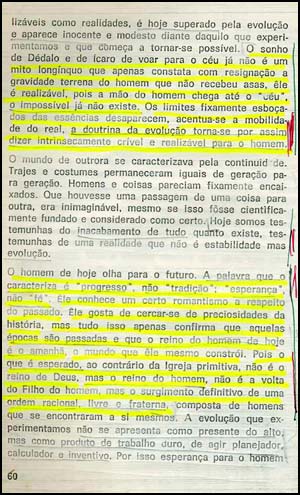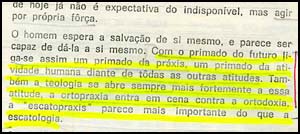In a context wherein he tries to justify the adaptation of Vatican II to the modern world, Fr. Ratzinger describes and accepts evolution as a characteristic of the modern age to which theology must adapt. We insist, the excerpt is not taken out of context. In his book there is no criticism of this modern attitude as bad. It is presented as a fait accompli.
At right, the cover of Faith and Future, below right, photocopies from the original Portuguese; below left, our translation of the highlighted text.
The dream of Dedalus and Icarus of flying to heaven is no longer a distant myth that ends with resignation to the earthly gravity of man, who was not given wings. It can be realized, because the hand of man reaches even to "heaven:" the impossible no longer exists. The strictly outlined boundaries of essences disappear, the mobility of the present day stands out, the doctrine of evolution becomes, so to speak, intrinsically credible and achievable for man. ... Today, we are witnesses of how everything that exists can never be finished, witnesses to a reality that is not stability, but evolution.
Today's man looks to the future. "Progress" is the world that characterizes him, not "tradition;" "hope," not "faith." He has a certain romanticism about the past. He likes to surround himself with precious things from History, but all this only confirms that those epochs are gone and that the kingdom of today's man is tomorrow, the world that he himself builds. For what is hoped for, different from the early Church, is not the kingdom of God, but the kingdom of man; it is not the return of the Son of man, but the definitive emergence of a rational, free and fraternal order. ...
Man expects salvation from himself, and seems to be capable of giving it. Thus, with the primacy of the future is linked the primacy of praxis [practice], a primacy of human activity before all other attitudes. Theology also increasingly opens itself to this attitude, orthopraxis enters the picture against orthodoxy, "eschathopraxis" seems more important than eschathology.
(Joseph Ratzinger, Fé e Futuro, Petrópolis: Vozes, 1971, pp. 60-61)
|



|
